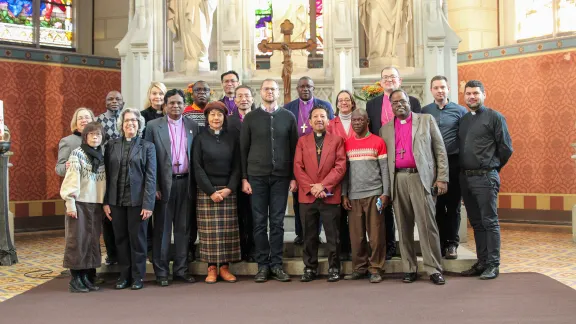The annual retreat of newly elected church leaders (RoNEL) gives bishops and church presidents a valuable opportunity to strengthen their understanding of leadership in the LWF communion and build networks among churches.

RoNEL participants and staff from LWF and LWF Center Wittenberg after a Sunday service in the Castle Church where Martin Luther had initiated the Reformation by posting his 95 theses more than 500 years ago. Photo: LWF/A. Weyermüller
Lutheran tradition and today’s church leadership responsibilities
(LWI) – As part of its leadership development program, The Lutheran World Federation (LWF) invites newly elected church leaders to a retreat (RoNEL) every year in Geneva and Wittenberg, Germany. In November 2023, fourteen bishops and church presidents participated in this nine-day event.
Under the theme “Leadership and Episcopal Ministry in the LWF Communion,” they shared their leadership journeys, heard about the different aspects of LWF’s work, and accompanied each other in spiritual renewal through daily prayer and worship.
During their stay in the LWF Center Wittenberg, Bishop Emeritus Frank Otfried July, Evangelical Lutheran Church in Württemberg, Germany, shared his insights from 17 years of service as a bishop.
July said that being elected to the episcopal ministry “is a vote of confidence from the electoral bodies or synods; it is a benchmark of expectation for the respective bishop, it is an inner spiritual and a theological challenge for those who take on this task – like you are now. The request for God’s guidance is of particular importance here.”
Speaking about the office of bishop according to the Lutheran tradition, Rev. Cheryl M. Peterson, Academic Dean of the Wartburg Theological Seminary in the USA, had explained that the Greek episkopos meant being a guardian or overseer. According to the reformer Martin Luther, a bishop should be elected to be “their servant, official, caretaker and guardian in regard to the gospel and the sacraments.”
During the Reformation, Luther issued several writings on the episcopal ministry and the bishop’s office. “It is helpful to keep in mind the important distinction the Lutheran Reformers made between territorial or political oversight and spiritual oversight,” Peterson said. “They were not comfortable with bishops exercising political oversight in the secular realm, but they were desperate for the bishops to take their spiritual episcopé more seriously.”
Meeting the challenge of church unity
From his context of a regional church in southwestern Germany today, July presented five areas of work that had taken up particular attention during his episcopate: public pastoral care, external representation of the church, leadership and church administration, ecumenical cooperation, and the office of unity.

Bishop Emeritus Frank Otfried July speaking to newly elected church leaders during their retreat (RoNEL) in the LWF Center Wittenberg, Germany. Photo: LWF/A. Weyermüller
“Despite the increasing tendencies towards secularization, churches and their leaders are expected to find and say words in special situations that a society cannot say to itself,” July noted. As an example, he recalled his pastoral actions in the wake of a school shooting in which 15 pupils were killed. “Public proclamation and pastoral care go beyond the local congregation,” he said.
“I always recommend that sisters and brothers in the episcopate seek out good, expert advisors so that they can develop their knowledge and positions more precisely in a trusting exchange,” July said, considering numerous areas of responsibility, diverse audiences, and complex societal issues to be addressed. Also, communication – speaking to and listening to different parties – was a crucial factor in all work areas.
July said that engaging in dialogue played an important role in many respects, including with ecumenical partners and negotiations in the political sphere, but particularly in the office of unity.
Unity within a church was “not about the lowest common denominator” but “about the truth of the gospel in the redemptive justification through Jesus Christ and the consequences of this for our lives and life together,” July said.
“The ministry of unity is a great challenge,” he noted. Remaining in the unity of the one church despite different interpretations and perspectives on Scripture and finding the boundaries was not easy.
Also, July said that the search for the greater unity of the church of Jesus Christ posed challenges. “Particularly in ecumenical dialogue, we are called upon to, on the one hand, not conceal our theological insight and positioning, indeed, to name them clearly, but at the same time be prepared to engage in new experiences and insights.”
The ministry of unity “involves a lot of time, dialogue, theological research and prayer,” July concluded.
Contextual and overarching challenges
The discussion among the newly elected church leaders echoed many of July’s points and introduced new contextual perspectives from participants.
Many churches compete against Pentecostal movements or other religions; many face misleading theologies, while others are small minorities. Conducting ecumenical dialogues under such circumstances proved difficult.
Some of the heads of churches shared that they had the encouraging experience that “being there” where people face crises had a strong impact even though they felt quite powerless in such situations themselves. The fact that the people were seen, and their situation acknowledged, helped them cope better.
At the personal level, several participants spoke of the support and strength their families gave them. At the same time, many found very little time to spend with the people closest to them due to their manifold responsibilities.
Taking time away from their church and day-to-day responsibilities during RoNEL to reflect on these challenges among fellow leaders proved very valuable. Times of prayer and communion with others played an important part during the days in Wittenberg.
The program also included Sunday service at the Castle Church, where Martin Luther had initiated the Reformation by posting his 95 theses more than 500 years ago.


